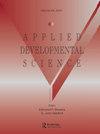越轨同伴联想对双系统模型发展的影响:抵抗同伴影响的保护作用
IF 1.5
3区 心理学
Q3 PSYCHOLOGY, DEVELOPMENTAL
引用次数: 2
摘要
摘要很少有研究考察了同伴影响对双系统模型结构发展的影响,并考察了青少年(年龄:14-26岁;~86%为男性)之间这些关系中的保护因素。本研究考察了越轨同伴联想对感觉寻求和冲动控制发展的预测相关性,以及抵抗同伴影响的调节作用。分析了Desistance的路径数据。混合效应模型检验了异常同伴联想对冲动控制和感觉寻求的直接影响,并确定了对同伴影响的抵抗是否调节了这些关系。研究结果表明,更大的越轨同伴联想与感觉寻求的增加和冲动控制的降低有关。对同伴影响的抵抗缓冲了异常同伴关联对冲动控制的影响,如显著负系数所示。其他分析表明,这种调节效应只与较低水平的越轨同伴关联有关。感觉寻求没有观察到适度。本文章由计算机程序翻译,如有差异,请以英文原文为准。
The influence of deviant peer association on dual systems model development: the protective role of resistance to peer influence
Abstract Little research has examined the relevance of peer influences for impacting development of dual systems model constructs and examined protective factors in these relationships among adolescents (Ages: 14-26; ∼86% male). This study examined the relevance of deviant peer association for predicting development of sensation-seeking and impulse control and the moderating role of resistance to peer influence. The Pathways to Desistance data were analyzed. Mixed effects models examined the direct effect of deviant peer association on impulse control and sensation-seeking and determine whether resistance to peer influence moderated these relationships. Findings indicated that greater deviant peer association was associated with increased sensation-seeking and lower impulse control. Resistance to peer influence buffered the effects of deviant peer association on impulse control, as indicated by a significant and negative coefficient. Additional analyses indicated that this moderation effect was only relevant at lower levels of deviant peer association. Moderation was not observed for sensation-seeking.
求助全文
通过发布文献求助,成功后即可免费获取论文全文。
去求助
来源期刊

Applied Developmental Science
PSYCHOLOGY, DEVELOPMENTAL-
CiteScore
12.00
自引率
2.60%
发文量
23
期刊介绍:
The focus of this multidisciplinary journal is the synthesis of research and application to promote positive development across the life span and across the globe. The journal publishes research that generates descriptive and explanatory knowledge about dynamic and reciprocal person-environment interactions essential to informed public dialogue, social policy, and preventive and development optimizing interventions. This includes research relevant to the development of individuals and social systems across the life span -- including the wide range of familial, biological, societal, cultural, physical, ecological, political and historical settings of human development.
 求助内容:
求助内容: 应助结果提醒方式:
应助结果提醒方式:


